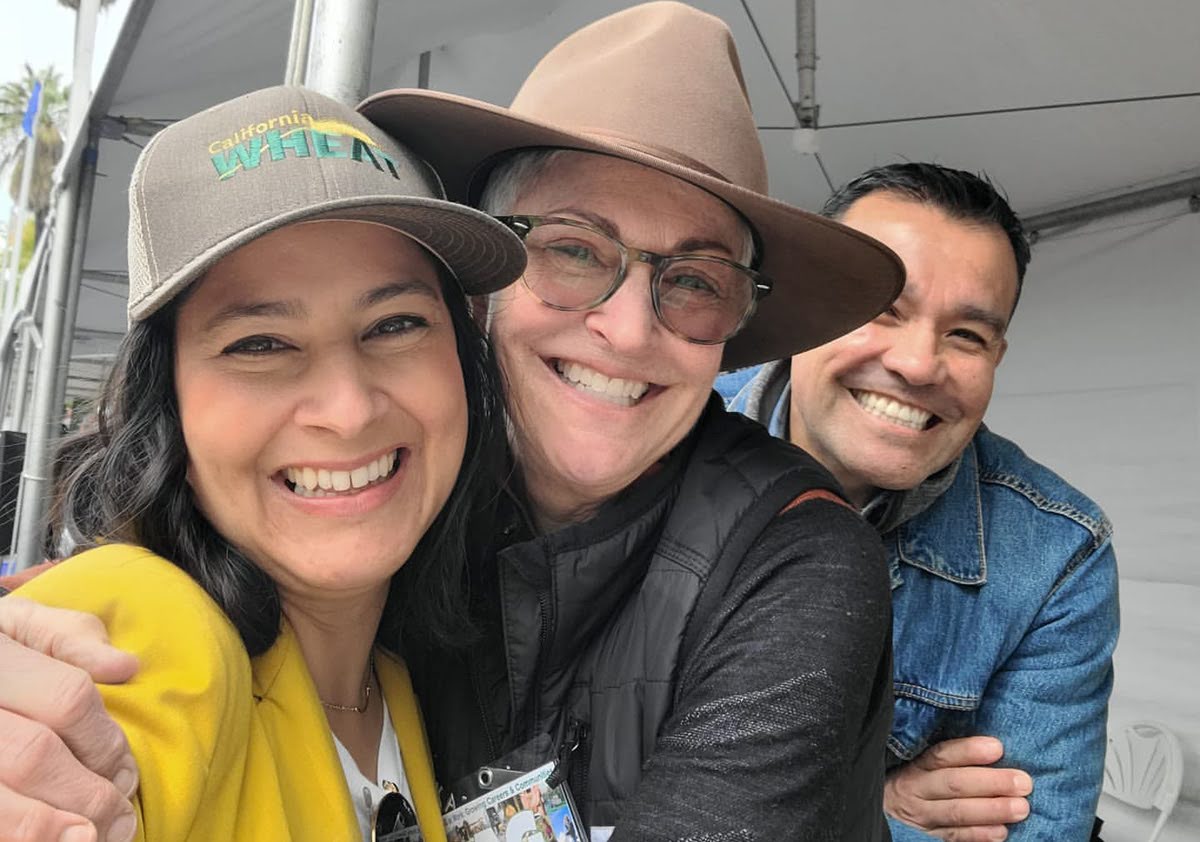I recently spoke with Claudia Carter, the Executive Director of the California Wheat Commission, about the Wheat2School Project she initiated in local schools.
Meet and Greet: CA Wheat Commission and the Beef2Institution

Claudia Carter (CA Wheat Commission), Kathy Webster (TomKat Ranch), and José Corona (Office of Kat Taylor, APC) at Ag Day at the Capital in Sacramento, CA.
04/22/2025
By: Kathy Webster
I recently spoke with Claudia Carter, the Executive Director of the California Wheat Commission, about the Wheat2School Project she initiated in local schools. I hoped to gain insights and explore ways to collaborate or replicate her vision in the Beef2Institution project.
Claudia and I first met when I took a whole-grain sourdough class last year with Baker Dave Miller at the California Wheat Commission kitchen and lab in Woodland, CA. Claudia and I hit it off as we are both passionate about nutrition, food, and agriculture. We stayed in touch, and I wanted to learn more about the Wheat2Schools Project she helped create.
With a background in food science and a master’s in cereal science, Claudia had no idea what kids ate in public schools until she sent her kids to one. Learning more about the nutritional deficiencies of the food provided at schools, Claudia has become even more passionate about making it healthier while increasing students’ awareness and knowledge of how their food is grown and raised. This was the start of the California Wheat Commission’s Wheat2School Project—connecting grains grown in school gardens to culturally relevant baked goods in the cafeteria.
At the heart of the program lies the free curriculum resources that the Wheat2School Project provides teachers to educate students about agriculture and the importance of whole grains in a healthy diet. Through hands-on learning experiences, including creating edible grain gardens, the project educates ‘future consumers’ about the value of sourcing locally, nutritional awareness, and sustainable food practices in their schools and communities.

The whole grain wheat and some of the delicious and nutritious end products.
The California Wheat Commission initially partnered with C.E. Dingle Elementary School in Woodland, California, to help convert the wheat grown in their school garden into whole-grain tortillas and other baked goods for meal options. This initiative allows students to experience the entire lifecycle of wheat—from growing the wheat themselves to milling and baking with it.
The California Wheat Commission partnered with community organizations like Yolo County’s Farm to Fork to help with the Dingle Elementary’s Wheat2School garden program. With grant funding from CDFA and USDA Farm-to-School, the commission was able to collaborate with interns from Cal Poly San Luis Obispo’s Ag Innovation Center, as well as San Luis Obispo schools, to provide website development, curriculum, and hands-on nutrition education, enabling the Wheat2Schools Project to expand throughout the region.
What is Claudia’s advice to others looking to change their school food programs? Establish relationships between farmers and schools first and foremost. Today, even though the grant funding has ended, both Woodland and San Luis Obispo school districts continue their garden wheat programs.
Looking to the future, Claudia is pursuing her PhD with a focus on the Wheat2Schools Project so that the program can be replicated in other states, incorporating classroom education with hands-on school gardens, cooking, and cafeteria integration. So far, through her PhD project, Claudia has collected data about the before and after effects of the program to assess students’ knowledge and attitudes towards whole grains. She is also in the process of collecting qualitative information from the adults administering the program to inform future farm-to-school educators about using wheat as a tool. With Claudia’s dedication and hard work, the seeds are being sown for healthier school meals.